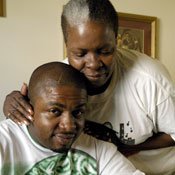Jackson resident Cedric Willis said he will still get his day in court regarding his malicious prosecution suit against the city of Jackson, though the judge has moved the court date to September.
"They cost me 12 years. I can't even explain it," said Willis, who filed the suit in 2007. "There's so much that could've been done. Me and my son could have had a better relationship. He's 15 now. I missed his first steps, his first words. I miss my grandmother—she passed away while I was in prison. There's a lot of emotion there. I can't explain this loss."
Willis' malicious-prosecution suit against the city of Jackson will continue Sept. 27 after Hinds County Judge Winston Kidd denied two motions last week. Willis claims city officers continued to press an "improper investigation" against him knowing that evidence would clear him.
After he spent 12 years behind bars for crimes he did not commit, Hinds County Circuit Court Judge Tomie Green exonerated Willis of all charges in 2006.
The suit includes the Jackson Police Department, former police officers Ned Garner, Jim Jones and Joe Wade, and current Deputy Chief Gerald Jones. Willis alleges that then-Sgt. Gerald Jones "fabricated information" by saying that a confidential informant had labeled Willis the perpetrator in the 1994 shooting death of Carl White Jr. and the armed robbery of his wife, Gloria, and daughter, Jamilla, as well as the 1994 armed robbery and aggravated assault of a woman and her husband near Queen Eleanor Lane.
Police arrested Willis, then 19, in 1994 for the suspected crimes. But Willis' attorney Rob McDuff says that police—including Gerald Jones—ignored witness' statements that three suspects committed the crimes against Davis, not one, and that police could not tie the car described in the descriptions to Willis, who did not own a car. Victims Gloria and Jamilla White also described a perpetrator weighing about 160 to 165 pounds. Willis weighed 230 pounds.
Willis' suit accuses Gerald Jones of lying about a confidential source connecting the rape crime with the White incident, and argues that calls from the district attorney's office to the confidential source netted a denial from the source about ever having spoken with Jones or anyone at the Jackson Police Department about either Willis or the murder of Carl White.
County prosecutors apparently did their part in muddying facts. Then-Hinds County prosecutor Bobby DeLaughter, convinced then-Hinds County Circuit Court judge Breland Hilburn to toss DNA evidence and witness testimony that could have exonerated Willis. DeLaughter later won multiple elections as Hinds County Circuit Court Judge, but is currently in federal prison after admitting to misleading federal prosecutors in a 2009 judicial corruption case
Jackson Police Department forensic ballistic testing concluded that the perpetrator used the same .45-caliber automatic in both the White and rape crimes, but DNA evidence collected from the rape scene proved that Willis did not commit the rape.
Prosecutors dropped the rape and armed-robbery charges related to the rape case, but Hilburn agreed to keep jurors from ever hearing about those charges being dropped. Jurors instead convicted Willis based on the police line-up identification, and Willis went to prison until New Orleans-based Innocence Project attorneys got Willis' conviction overturned in 2006 with the same DNA evidence DeLaughter convinced Hilburn to ignore.
The city of Jackson argues in its July 9, 2010, motion for summary judgment that Willis does not successfully reveal that any specific city ordinance, regulation, custom or policy led to his arrest. Instead, the city claims Willis "relies on the individual actions" of police involved with the case since "there is no consistent policy or practice of the city to prepare suggestive (police) line-ups."
The city also argues that even if the police officers involved in conducting the Willis case "may not have performed a perfect police investigation," the officers still qualify for immunity because Willis failed to provide evidence, other than allegations contained in the complaint, that police knowingly violated the law.
Last week, Judge Kidd rejected Willis' motion for a summary judgment against the city due to the fact that the city had not responded to the plaintiff's information requests in a timely manner. In his decision, Kidd argued that "there are genuine issues of material facts … and the motion is not well taken and should be denied."
Kidd also rejected the city's July motion for summary judgment, concluding that the motion, which the city submitted 25 days after the court's deadline, is untimely. The judge also determined that the arguments in the city's motion are "without merit."



Comments
Use the comment form below to begin a discussion about this content.
comments powered by Disqus